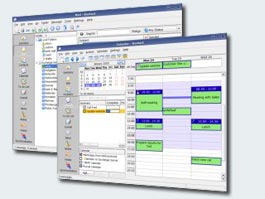Kontact
 |
Kontact это объединенный менеджер личной информации(PIM) из KDE. |
Kontact объединяет зрелые и испытанные KDE PIM приложения вместе. Отдельные приложения интегрируются в одно целое, благодаря мощной технологии KPart.
Компоненты KDE Kontact приспособлены для работы друг с другом. Это приводит к таким функциям, как интуитивно понятное перемещение между назначенными встречами, списком задач и контактами. KDE Kontact поддерживает разные серверы групповой работы. При использовании таких серверов рабочая группа имеет доступ к таким функциям, как общие почтовые папки, списки групповых задач, общий календарь, централизованная адресная книга и планирование встреч.
Если кратко: KDE Kontact предоставляет инновации, помогающие управлять общением с большей лёгкостью, организовывать работу быстрее и более тесно сотрудничать, получая повышение производительности труда в цифровом сотрудничестве.
Компоненты
Эти приложения могут быть встроены в Kontact:
- Akregator - Чтение любимых каналов
- KAddressBook - Управление своими контактами
- KJots - Идеи в виде записной книжки
- KMail - Почтовый клиент
- KNode - Чтение usenet почты
- KNotes - Липкие заметки на рабочий стол
- KOrganizer - Календарь, расписание и журнал
- Ktimetracker - Следите сколько времени расходуется на разные задачи
- Summary - Результирующий экран
Смотрите так же
- * Как отправить SMS, используя Kontac
- * Версии большинства компонентов под мобильные устройства(в настоящее время Maemo/Windows Mobile)
Где получить помощь
Существуют списки рассылки на
- kdepim-users - for users of the KDE PIM applications (Kontact, KAddressBook, KMail, KOrganizer, KNode, ...) [subscribe to kdepim-users] [archive of kdepim-users]. A team of developers and users aim to give answers as quickly as possible
and for urgent help, an IRC channel on Freenode
- for users and developers of Kontact - #kontact
Akonadi and KAddressBook
- if you have problems concerning Akonadi and the new KAddressBook, there are pages dedicated to these issues
- Akonadi
- Akonadi's troubleshooting page
- KAddressBook
- Akonadi and your AddressBook
FAQ, Hints and Tips
Migrating your setup to a new distro
In KMail, right click on your Inbox and choose Properties. Go the Maintenance Tab. Have a look at the Location. It has either .kde4 or .kde in the path.
Substitute the appropriate path below.
You need the following config files:
- .kde4/share/config/emaildefaults
- .kde4/share/config/emailidentities
- .kde4/share/config/kmail.eventsrc
- .kde4/share/config/kmailrc
- .kde4/share/config/kaddressbookrc
- .kde4/share/config/kresources/contact
- .kde4/share/config/korgacrc
- .kde4/share/config/korganizerrc
- .kde4/share/config/knotesrc
- .kde4/share/config/mailtransports
And the following directories:
- .kde4/share/apps/kmail
- .kde4/share/apps/kabc
- .kde4/share/apps/korganizer
- .kde4/share/apps/knotes
If you use Akregator within Kontact, you will also need:
- .kde4/share/config/akregator.eventsrc
- .kde4/share/config/akregatorrc
And the whole .kde4/share/apps/akregator directory.
Of course the simplest way is just to keep your whole home directory.
Just a word of warning. If the directory naming is different between Desktops or between the two versions of your distro, this will not work as there are references to the directories within the config files. This means that if the files were in a .kde directory, you cannot just put them in a .kde4 directory without editing the references within the config files.
Hiding the Kontact Sidebar
On small screens, you may wish to reclaim the space used by the Kontact sidebar. You can replace it with an (editable) toolbar:
- Settings->Toolbars->Navigator [x]
- Drag the left panel closed using the splitter between it and the main panel, job done.
Enabling SOCKS support in KMail and KNode
Unlike KDE 3, KDE 4 does not have built-in SOCKS support yet. However, it is still possible and relatively simple to make KMail and KNode use a SOCKS proxy, by using proxychains or other similar tools like tsocks or socksify. Assuming that proxychains is correctly installed and configured, all you need to do is to open a terminal (e.g. Konsole) and type:
proxychains kdeinit4
You don't even need to restart KMail/KNode! (You need to type the above command every time you start a new KDE session though).
